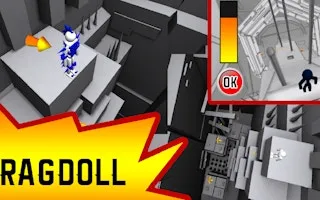Simulation Games
33 games in total. Page 1 of 1
Discover the world of Simulation games, where realism meets creativity. Explore a wide range of immersive experiences, from building cities to managing farms, in the most engaging and educational games across the globe.
Simulation games have long captivated players with their ability to simulate real-world activities, providing an immersive blend of entertainment, education, and strategic thinking. Whether you’re constructing sprawling cities, managing a farm, or piloting a plane, simulation games offer a unique experience unlike any other genre. The appeal lies in their versatility: they can replicate everything from mundane daily tasks to complex systems like economies or entire ecosystems.
The Allure of Simulation Games
At their core, simulation games are about immersion. They allow players to step into a variety of roles, offering them the chance to manage, build, create, or destroy, often in realistic or fantastical settings. The primary appeal of simulation games is how they emulate real-life systems, providing a platform for creativity, critical thinking, and problem-solving. One standout example is Farming Simulator 22, a game beloved for its realistic portrayal of agricultural life. Players manage crops, livestock, and machinery, learning the intricacies of farming in a way that's both engaging and educational. Similarly, titles like Planet Coaster let players become amusement park tycoons, managing everything from the layout of rides to the satisfaction of guests. Another aspect that draws people to simulation games is the wide variety of sub-genres. For instance, fans of vehicle simulation can enjoy games like Euro Truck Simulator 2, where they can build their trucking empire while navigating the highways of Europe. The game’s meticulous attention to detail, from fuel consumption to route planning, makes it a standout in the genre.Building and Management Simulations
A major sub-category of simulation games revolves around city-building and management. These games allow players to manage resources, plan infrastructure, and make strategic decisions to grow their virtual empires. One of the most famous examples of this genre is SimCity, a pioneer in city-building games, which has inspired countless others like Cities: Skylines. In these games, success hinges on effective resource management. Players must balance the needs of their citizens with the resources available, all while planning for future growth. These titles are particularly appealing to fans of strategic gameplay, offering hours of in-depth management and problem-solving. Beyond cities, players can also explore business management simulations. Two Point Hospital, for instance, puts players in charge of running a hospital, dealing with staff, patients, and medical emergencies. The balance between humor and challenge in this game makes it both entertaining and rewarding.Realistic vs. Fantastical Simulations
While some simulation games strive for realism, others embrace more fantastical elements. For example, The Sims is arguably the most well-known life simulation game, where players control the lives of virtual characters, guiding them through careers, relationships, and personal development. This game combines realistic aspects of daily life with the freedom to create outlandish scenarios, making it an enduring favorite among simulation fans. On the other hand, games like Flight Simulator or PC Building Simulator aim for near-perfect accuracy, appealing to players who want a realistic experience. These games require players to master complex systems, whether that’s piloting an aircraft or assembling a computer. The level of detail and realism in these titles often leads to a deeper sense of accomplishment when players succeed.The Educational Value of Simulation Games
One of the most fascinating aspects of simulation games is their educational potential. Many of these games serve as informal learning tools, teaching players about complex systems in a fun, interactive way. Games like Farming Simulator 22 can teach players about agriculture, crop rotation, and economics, while PC Building Simulator provides valuable insights into computer assembly and troubleshooting. Simulation games are also being used in educational settings to teach a range of subjects, from economics to environmental science. These games allow students to engage with the material in a hands-on way, deepening their understanding and making learning more engaging. In particular, games like Civilization VI offer players lessons in strategy, history, and resource management. Players must think critically about how they expand their empires, balance resources, and negotiate with other civilizations.Immersive Experiences: Virtual Reality and Beyond
As technology continues to evolve, simulation games are pushing the boundaries of immersion. Virtual reality (VR) is becoming a popular platform for simulation games, offering players an even more engaging experience. Titles like Job Simulator and Beat Saber show how VR can bring simulation games to life, offering players the chance to interact with virtual environments in entirely new ways. Open-world simulation games are another area of growth in the genre. These games provide vast, dynamic environments for players to explore and interact with, offering an unparalleled sense of freedom. No Man’s Sky is a notable example, where players can explore an almost infinite universe, each planet offering new resources, wildlife, and challenges.The Future of Simulation Games
The future of simulation games is bright, with advancements in technology opening up new possibilities for more realistic, immersive, and educational experiences. With the rise of artificial intelligence and machine learning, simulation games will likely become even more complex and adaptive, offering personalized challenges and experiences based on player behavior. As virtual reality and augmented reality technology improve, we can expect simulation games to become even more immersive, blurring the lines between the virtual and real worlds. Players will be able to experience the thrill of flying a plane, managing a business, or building a city in ways that feel more authentic than ever before. Simulation games offer something for everyone, from the casual player looking for a fun way to pass the time to the serious gamer seeking a deep, complex experience. Whether you’re managing a virtual farm, piloting a plane, or building a bustling city, simulation games provide an unparalleled combination of entertainment and education. As technology continues to advance, the genre will only grow more immersive and exciting, offering players even more opportunities to explore and create.PunyGame © 2022. All rights reserved.
































